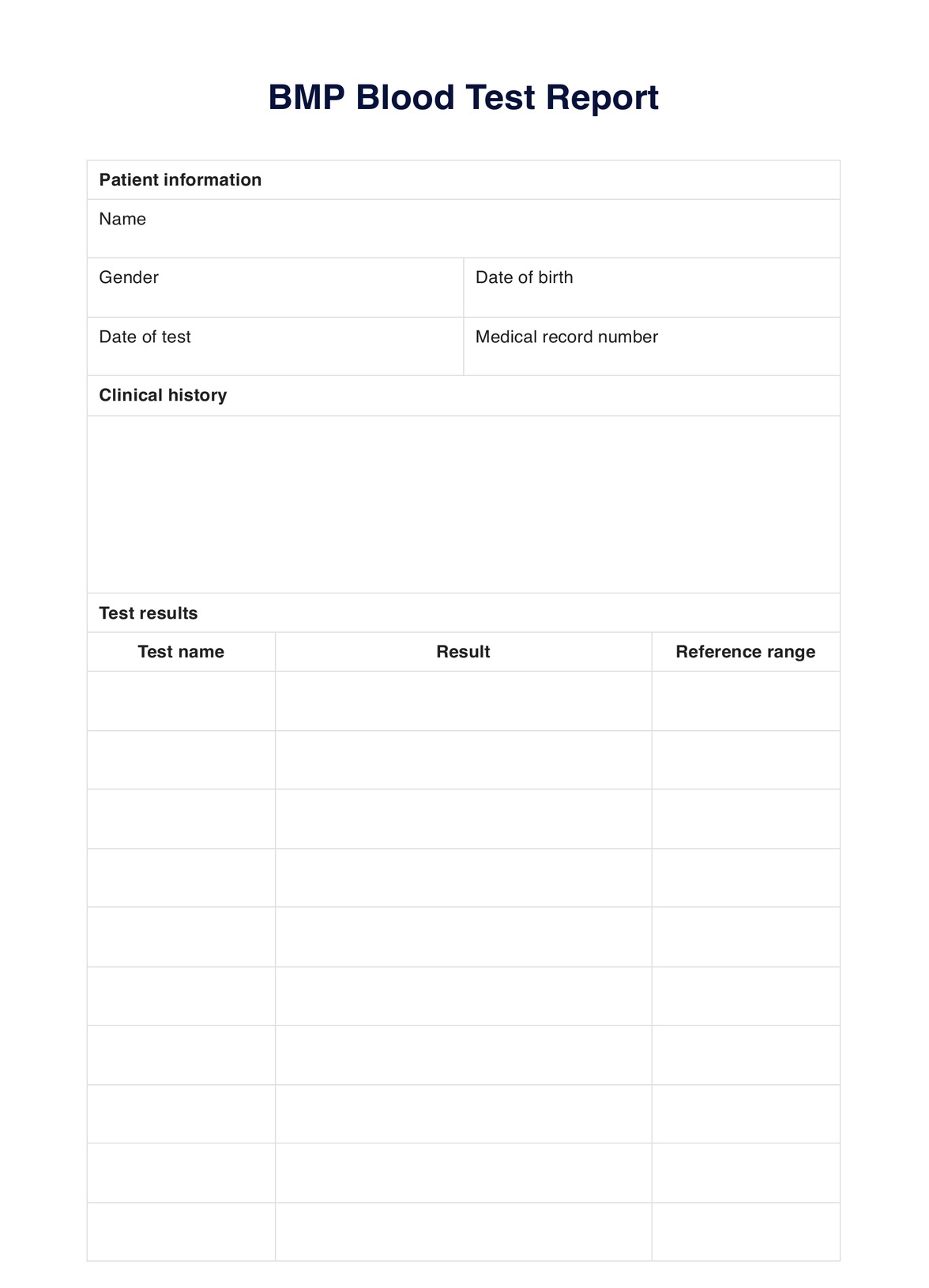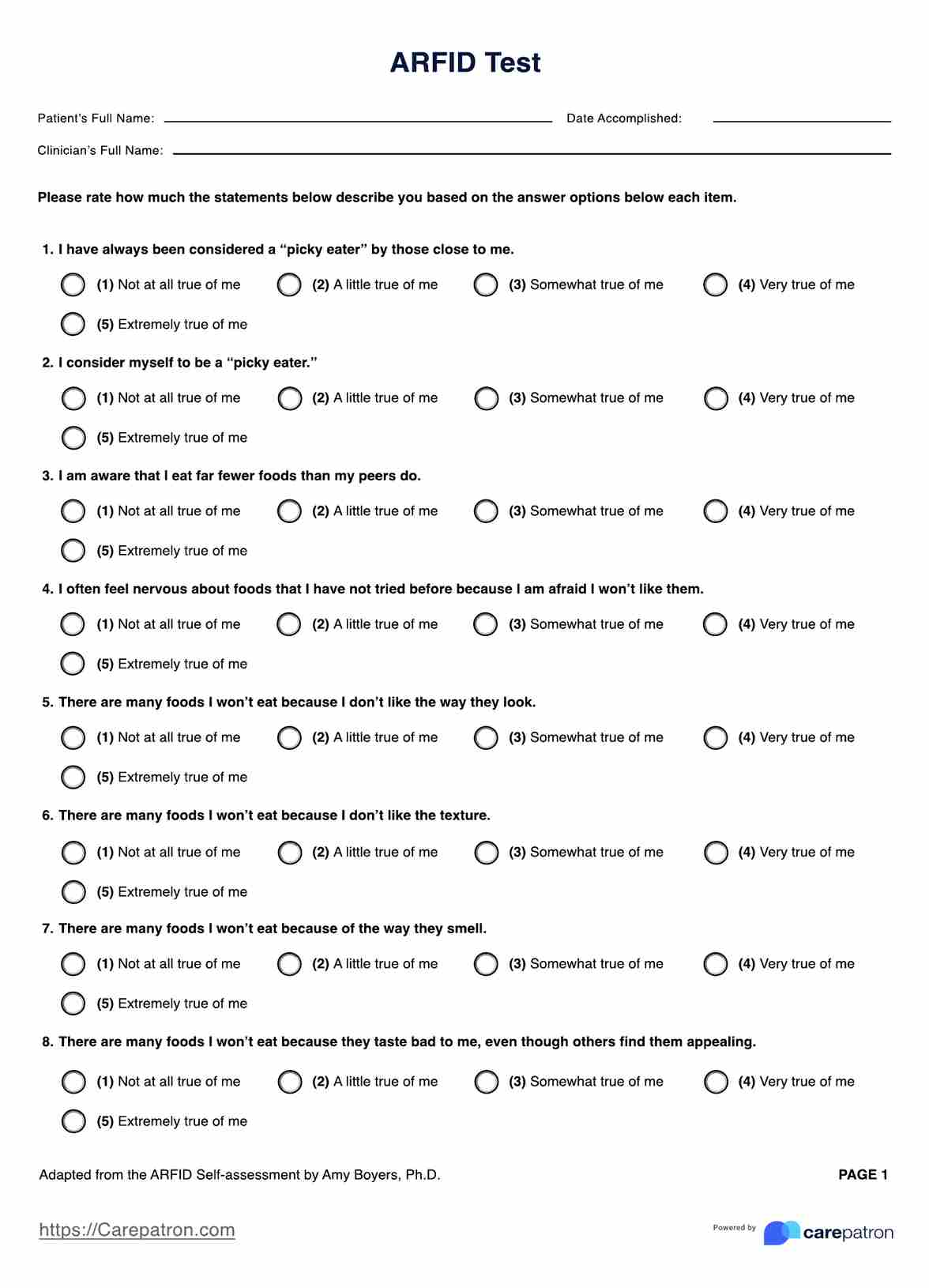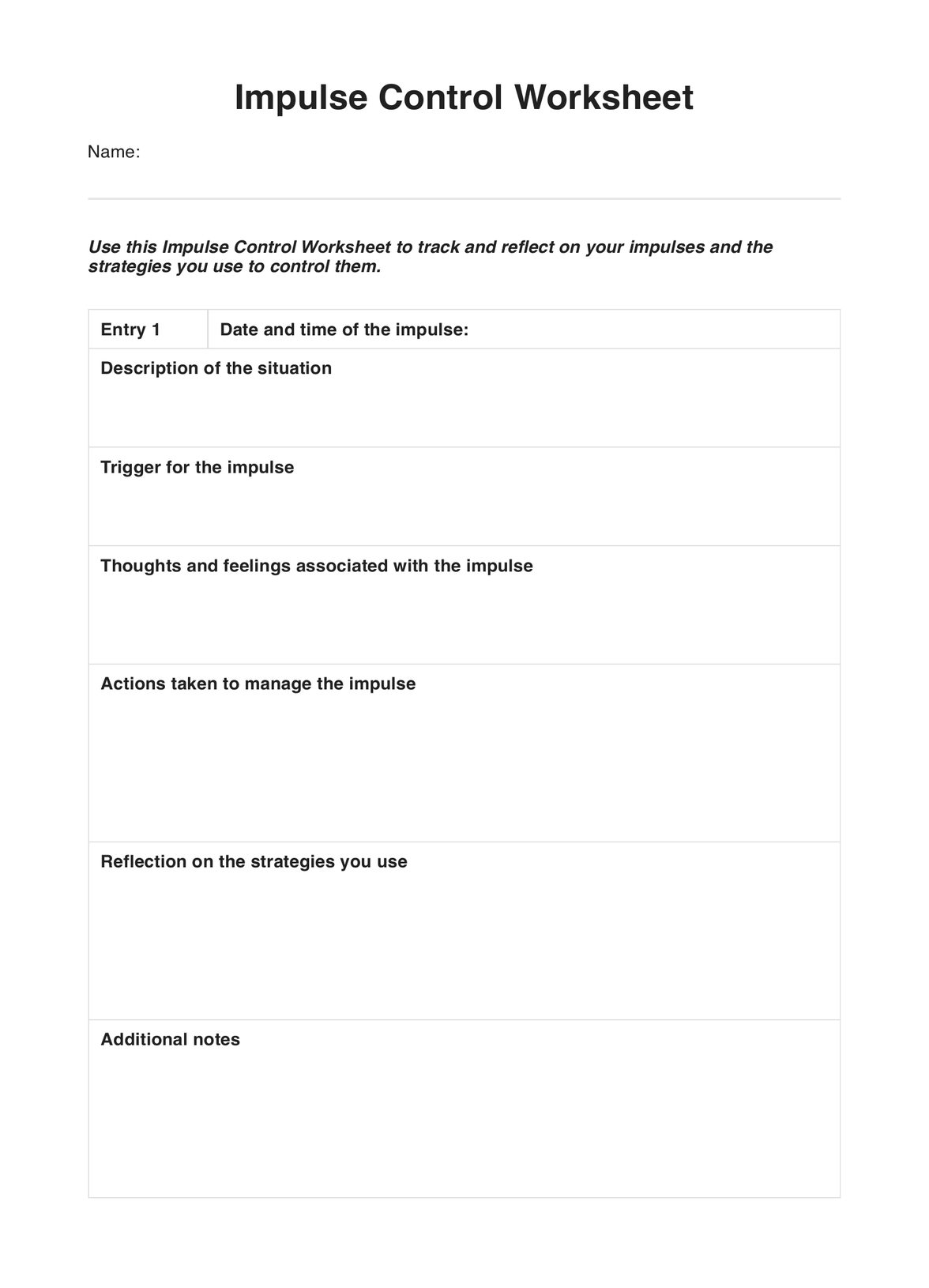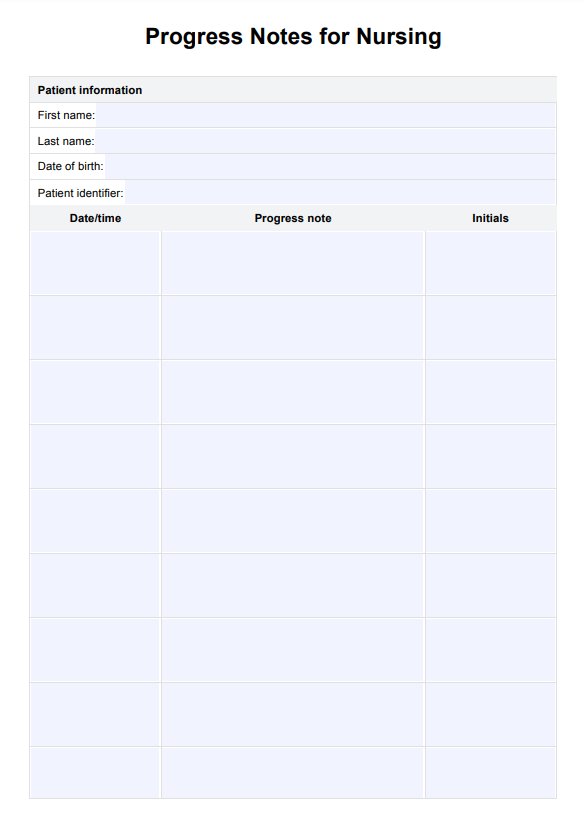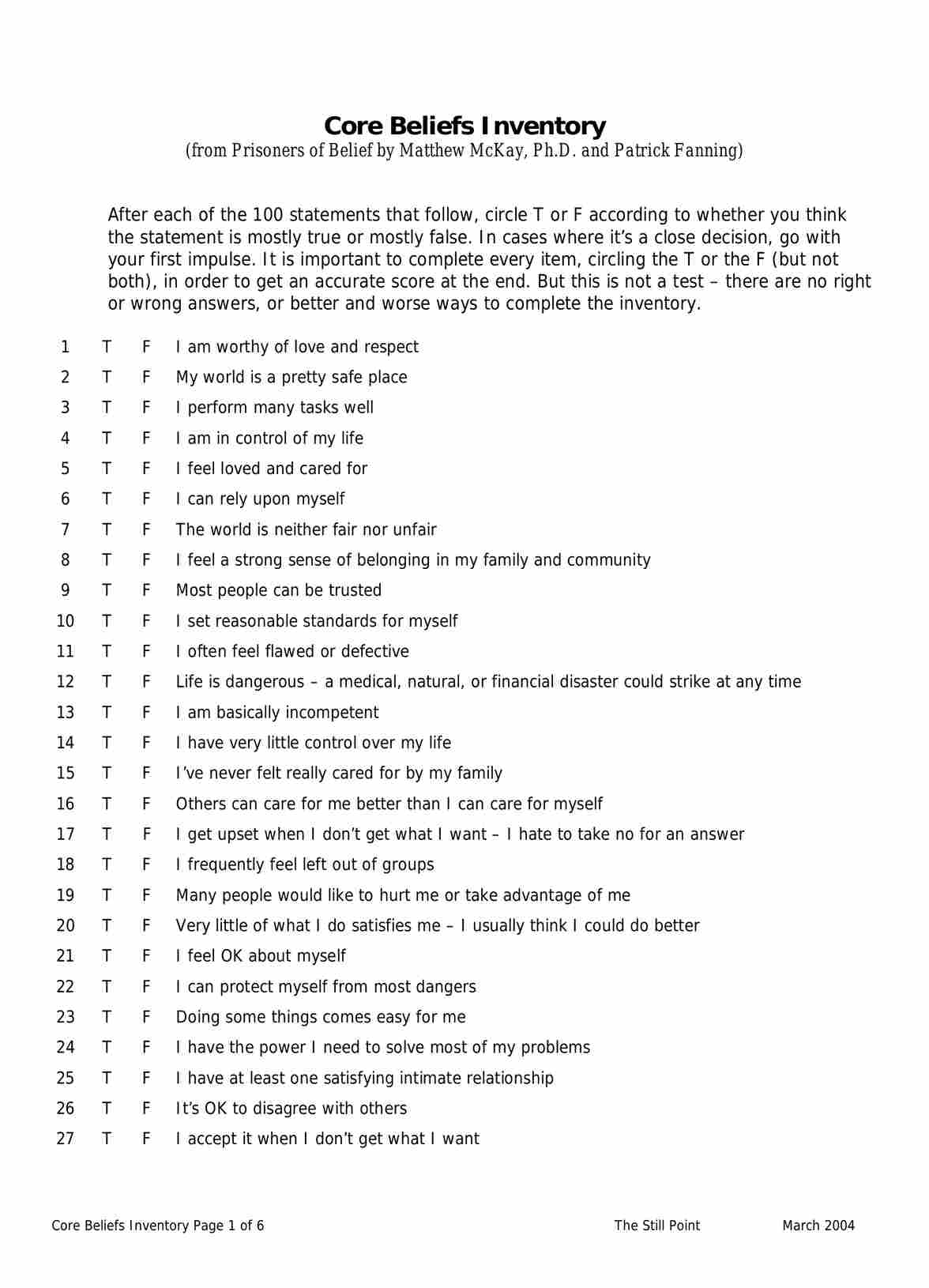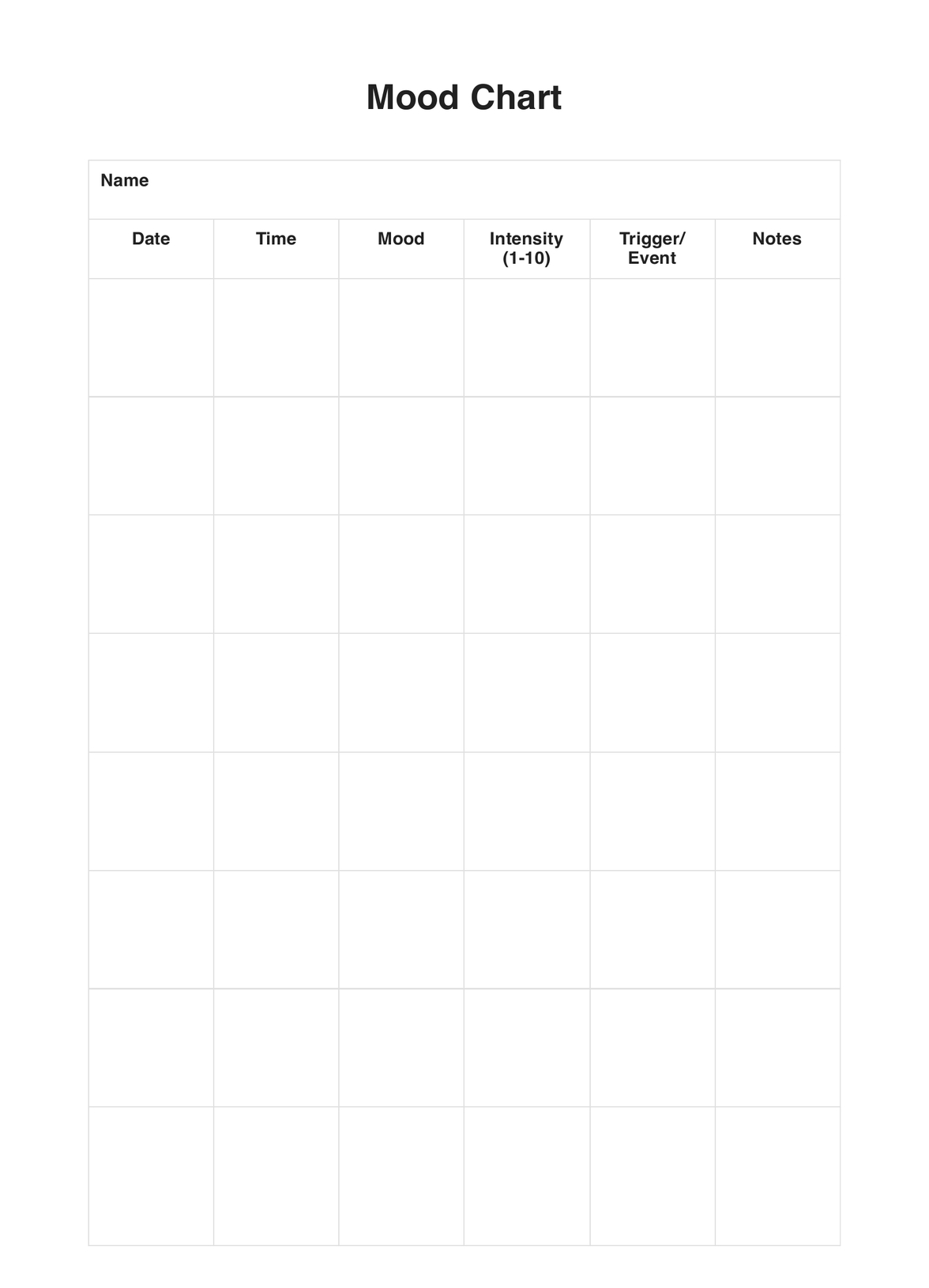Postpartum Depression Handouts
Explore comprehensive Postpartum Depression Handouts from Carepatron. User-friendly, informative & designed to help you manage postpartum depression effectively.


What is a Postpartum Depression Handout?
A Postpartum Depression Handout is a valuable informational resource designed to educate individuals, particularly new mothers, about postpartum depression (PPD), a mental health condition that can affect women after childbirth. This handout is often distributed by healthcare providers, mental health professionals, and human services organizations to offer support, guidance, and information on recognizing and managing postpartum depression.
Postpartum depression, also known as perinatal depression, is a mood disorder that affects some women after giving birth. Healthcare providers must provide pregnant women and their families with information on the symptoms and risk factors associated with postpartum depression. The handout typically includes a list of common symptoms, such as persistent feelings of sadness, changes in sleep patterns, anxiety, and difficulty bonding with the new baby.
The document emphasizes the importance of depression screening during pregnancy and the first few weeks postpartum. Mental health professionals often recommend routine screenings to identify potential issues early, allowing for timely intervention and support. The handout may highlight various treatment options, including therapy, medication, and support groups.
For women experiencing postpartum depression, the handout directs them to seek help from their healthcare provider as soon as possible. This may involve contacting a mental health professional specializing in perinatal depression or joining support groups where they can connect with others facing similar challenges. Emotional support from family and friends and open communication about feelings and experiences are also encouraged.
The handout may cover the importance of addressing risk factors such as a history of depression, family history of mood disorders, or substance abuse. It underscores the need for a comprehensive approach to women's health, including mental health, during and after pregnancy.
The handout provides information about accessing immediate medical care and emergency services. It emphasizes the significance of treating depression promptly to prevent potential complications for both the mother and the baby, such as impaired child health and bonding difficulties.
A Postpartum Depression Handout serves as a crucial tool in promoting awareness, understanding, and support for women and their families, offering helpful information to navigate the complexities of mental health during the postpartum period.
Postpartum Depression Handouts Template
Postpartum Depression Handouts Example
How does it work?
Understanding and addressing postpartum depression involves a thoughtful journey through the comprehensive guidance provided in a Postpartum Depression Handout. This essential resource serves as a roadmap for individuals navigating the complexities of their emotional well-being during the postpartum period, offering a structured approach to the multifaceted aspects of the condition. Follow these steps to fill out the handout:
Step 1: Grasp the content
Dive into the Postpartum Depression Handout, a treasure trove of knowledge covering the essence of postpartum depression. Delve into topics like symptoms, causes, and nuanced insights that lay the foundation for navigating this complex mental health aspect.
Step 2: Engage in self-assessment
Unearth the self-assessment tools embedded within the handout, designed to illuminate potential signs of postpartum depression. These tools, often in the form of questionnaires, facilitate thoughtful self-exploration, aiding in recognizing and comprehending your emotional state.
Step 3: Put suggestions into action
Translate insights into action by exploring and embracing the coping strategies offered. From self-care practices to guidance on seeking professional help, these recommendations are practical tools to navigate the intricate landscape of postpartum emotional well-being.
Step 4: Develop a Safety Plan
In moments of severity, the handout becomes a lifeline, guiding the construction of a personalized safety plan. This plan outlines crucial steps during a crisis, ensuring preparedness and a clear path to immediate help when required.
This comprehensive guide is about individual empowerment and extends its reach to family members and the broader support network. Recognizing the role of loved ones in the journey, the handout emphasizes the importance of their understanding and involvement.
As you progress through these steps, consider involving family members in your exploration. By fostering a shared comprehension of postpartum depression, the support system becomes integral in the healing process.
Remember, the journey through postpartum depression is not solitary; it's a collective endeavor involving understanding, empathy, and shared commitment. For your convenience, we offer Printable Postpartum Depression Handouts, ensuring accessibility to this valuable resource at your fingertips.
Strengthen your practice and client outcomes by leveraging this safety plan template.
When would you use this Template?
Our Postpartum Depression Handouts serve as a versatile tool — they can be effectively used by various healthcare providers, including, but not limited to, nurses, doctors, therapists, and midwives who engage with new mothers and their families.
During prenatal and postnatal care
These Postpartum Depression Handouts can be introduced during prenatal classes as a part of mental health education, preparing expectant mothers for possible emotional changes post-delivery. Following childbirth, they can be referenced again during postnatal appointments to discuss the mother's emotional well-being and to compare any reported feelings with the symptoms detailed in the handout.
Consultations and therapy sessions
Nursing consultations and therapy sessions are further touchpoints where the Postpartum Depression Handouts can be used. For nurses, they can be a part of the overall care strategy, facilitating a deeper discussion about postpartum mental health. Therapists can utilize the handouts to explain the intricacies of PPD, dispel any misconceptions, and introduce coping strategies.
As a self-help resource
Beyond healthcare professionals, these Postpartum Depression Handouts are also an invaluable self-help resource for new mothers and their families. By providing comprehensive, user-friendly information, these handouts enable families to understand what postpartum depression is, identify its signs, and learn about various treatment options. They empower mothers and their loved ones to manage postpartum mental health and seek help when needed actively.
Postpartum Depression Handouts are an effective tool for anyone with postpartum depression, whether as a healthcare provider, a new mother, or a supportive family member. Their use can help facilitate meaningful conversations about postpartum mental health, promoting early detection, treatment, and overall well-being.
Benefits
The Postpartum Depression Handout is an invaluable resource for health experts and practitioners, offering myriad benefits that contribute to enhanced care for mothers and their children. Here are five key advantages of utilizing this comprehensive guide:
Early diagnosis and intervention
The handout facilitates early identification of postpartum depression symptoms. Health experts can utilize the information to educate mothers about the signs to watch for, fostering a proactive approach to diagnosis. Early intervention is crucial in mitigating the impact of postpartum depression on both maternal and child health.
Tailored counseling approaches
Armed with a wealth of information on coping strategies and recommended treatments, health professionals can employ more targeted counseling sessions. The handout guides counselors to tailor their approaches based on each other's needs and circumstances, ensuring a more personalized and effective intervention.
Informed decision-making during childbirth
Health experts can use the handout to engage expectant mothers in informed discussions about the potential risks of postpartum depression. This preemptive dialogue empowers mothers to make decisions aligned with their mental health, influencing choices around childbirth practices, breastfeeding, and postpartum care.
Alleviating guilt and worry
Postpartum depression often brings feelings of guilt and worry to mothers. The handout addresses these emotions head-on, offering insights that can help health experts guide mothers in understanding that seeking help is not a sign of weakness but a proactive step towards better mental health. This contributes to a more compassionate and supportive environment.
Family involvement and support
The handout emphasizes the role of family in supporting mothers through postpartum depression. Health professionals can use this resource to educate family members, fostering a supportive environment that acknowledges the challenges mothers may face. Involving the family in the recovery journey can significantly enhance treatments' effectiveness.
Evidence-based practices and resources
Grounded in research, the handout compiles evidence-based practices for treating postpartum depression. Health experts can confidently rely on the information provided, ensuring that interventions are aligned with the latest research findings. Additionally, the handout serves as a gateway to additional resources, offering a comprehensive toolkit for professionals seeking to enhance their knowledge and approach.
Research & Evidence
History
The history of the Postpartum Depression Handout is rooted in a growing awareness of the prevalence and impact of postpartum depression (PPD) on maternal mental health. As healthcare professionals recognized the need for accessible and informative resources, the development of this handout gained momentum.
Related resources
Extensive research forms the foundation of the handout's content. The document draws from contemporary studies exploring various facets of postpartum depression, including risk factors, symptoms, and effective interventions. Researchers have consistently emphasized the importance of early detection and intervention in improving outcomes for both mothers and their children (Field, 2010; O'Hara & Wisner, 2014).
Moreover, the handout incorporates evidence-based practices derived from established therapeutic approaches. Research on counseling and psychotherapeutic interventions, such as interpersonal therapy and cognitive-behavioral therapy, has informed the recommendations provided in the handout (Stuart, 2014; Dennis & Dowswell, 2013).
The evolution of the handout mirrors a paradigm shift in perinatal care, acknowledging the interconnectedness of physical and mental health during the postpartum period. Recent studies stress the significance of involving family members and support networks in treatment (Shorey et al., 2018).
In summary, the Postpartum Depression Handout is a product of ongoing research endeavors aimed at enhancing the understanding and management of postpartum depression. Its content is steeped in the latest evidence-based practices, reflecting a commitment to providing healthcare professionals with a reliable and up-to-date resource.
References
- Dennis, C. L., & Dowswell, T. (2013). Psychosocial and psychological interventions for preventing postpartum depression. Cochrane Database of Systematic Reviews, (2), CD001134.
- Field, T. (2010). Postpartum depression effects on early interactions, parenting, and safety practices: A review. Infant Behavior and Development, 33(1), 1-6.
- O'Hara, M. W., & Wisner, K. L. (2014). Perinatal mental illness: Definition, description and aetiology. Best Practice & Research Clinical Obstetrics & Gynaecology, 28(1), 3-12.
- Shorey, S., Chee, C. Y. I., Ng, E. D., Chan, Y. H., & Tam, W. W. S. (2018). Prevalence and incidence of postpartum depression among healthy mothers: A systematic review and meta-analysis. Journal of Psychiatric Research, 104, 235-248.
- Stuart, S. (2014). Interpersonal psychotherapy for postpartum depression: A treatment program. Archives of Women's Mental Health, 17(3), 211-213.
Commonly asked questions
Postpartum Depression Handouts are utilized by healthcare professionals, mental health practitioners, and support groups. They are designed to be a comprehensive resource for anyone involved in the care and well-being of mothers during the postpartum period.
Postpartum Depression Handouts are employed during pregnancy, providing expectant mothers and their families with essential information about postpartum depression. They continue to be a valuable resource in the postpartum period, aiding in the early identification of symptoms, counseling sessions, and developing personalized safety plans.
These handouts are used as educational tools during prenatal visits, mental health assessments, and postpartum check-ups. Healthcare professionals distribute them to mothers and their families, encouraging self-assessment, fostering informed decision-making, and guiding discussions on coping strategies and available treatments.
Postpartum Depression Handouts serve as a comprehensive guide, offering information on the symptoms, risk factors, and treatments for postpartum depression. They empower individuals to understand and navigate the complexities of maternal mental health, fostering early detection, intervention, and emotional support for mothers and their families.

.jpg)
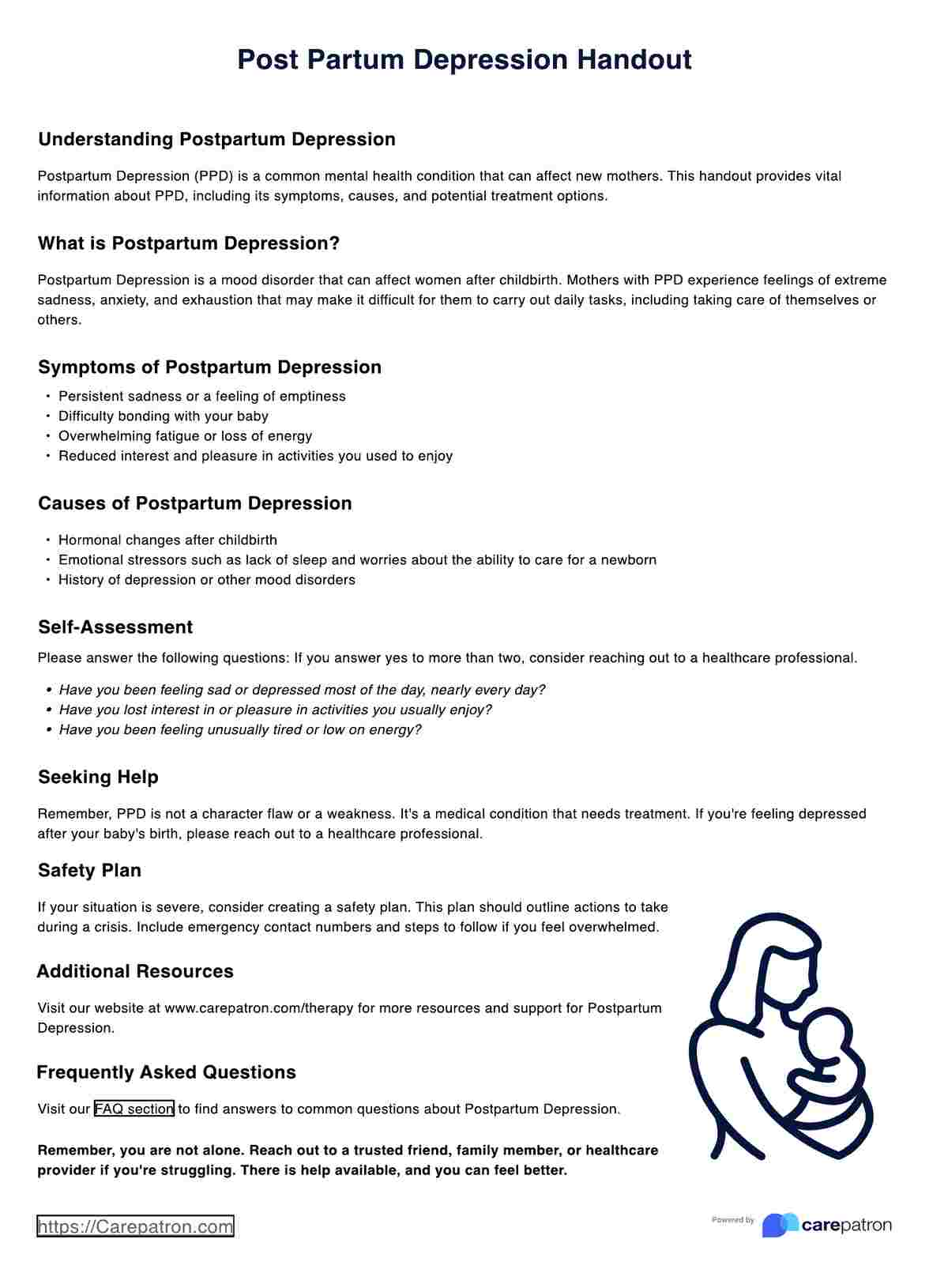
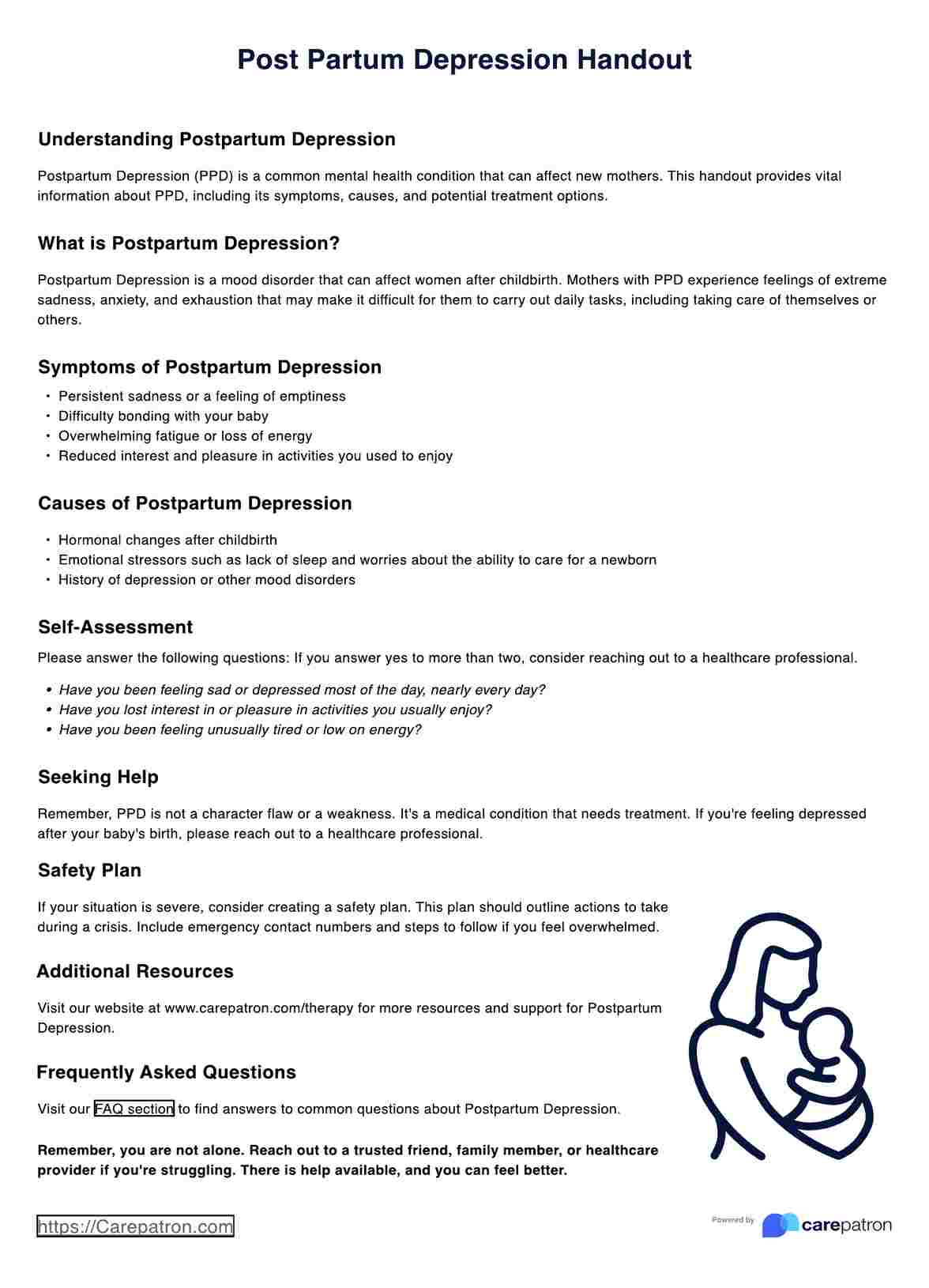

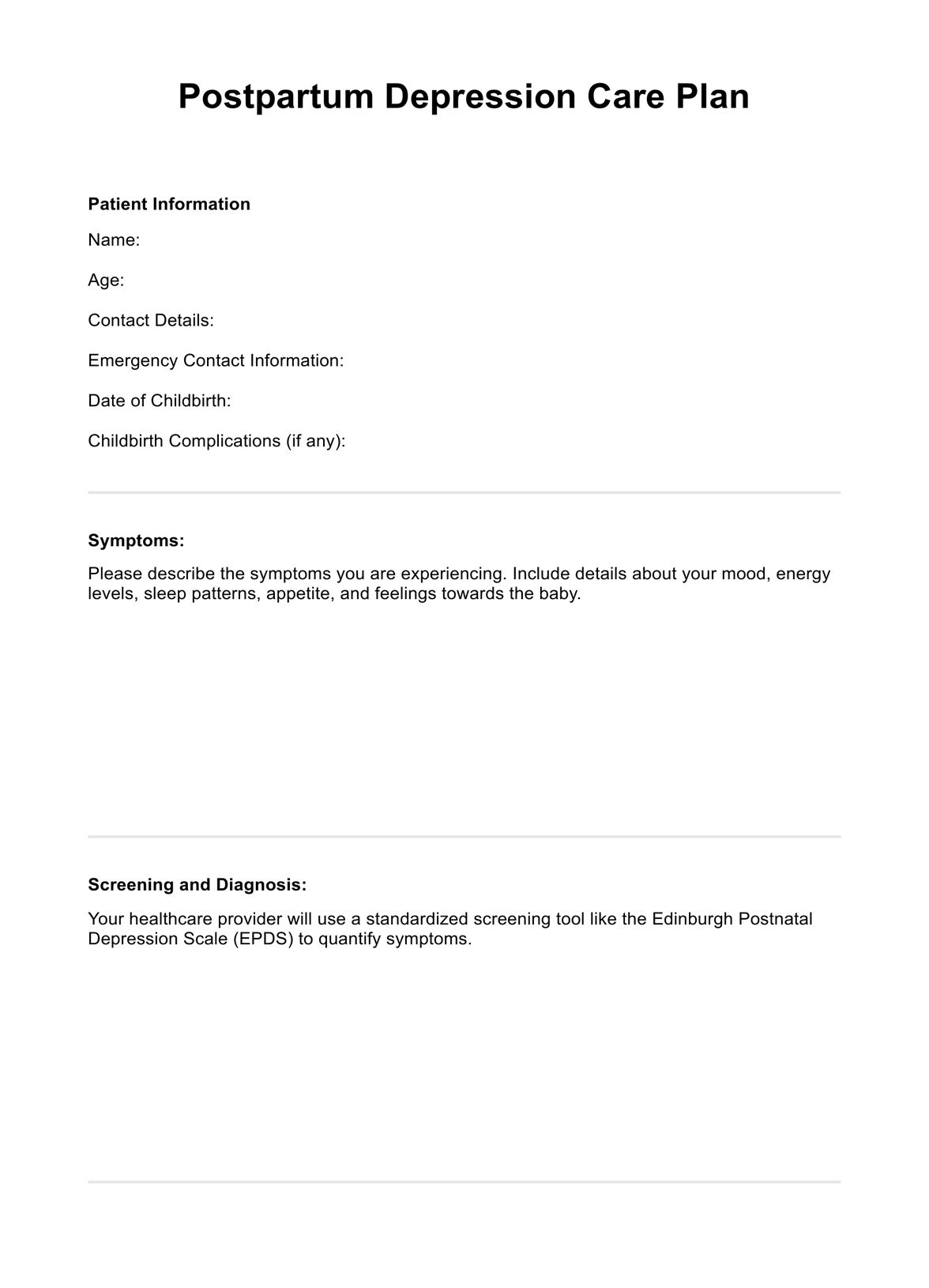
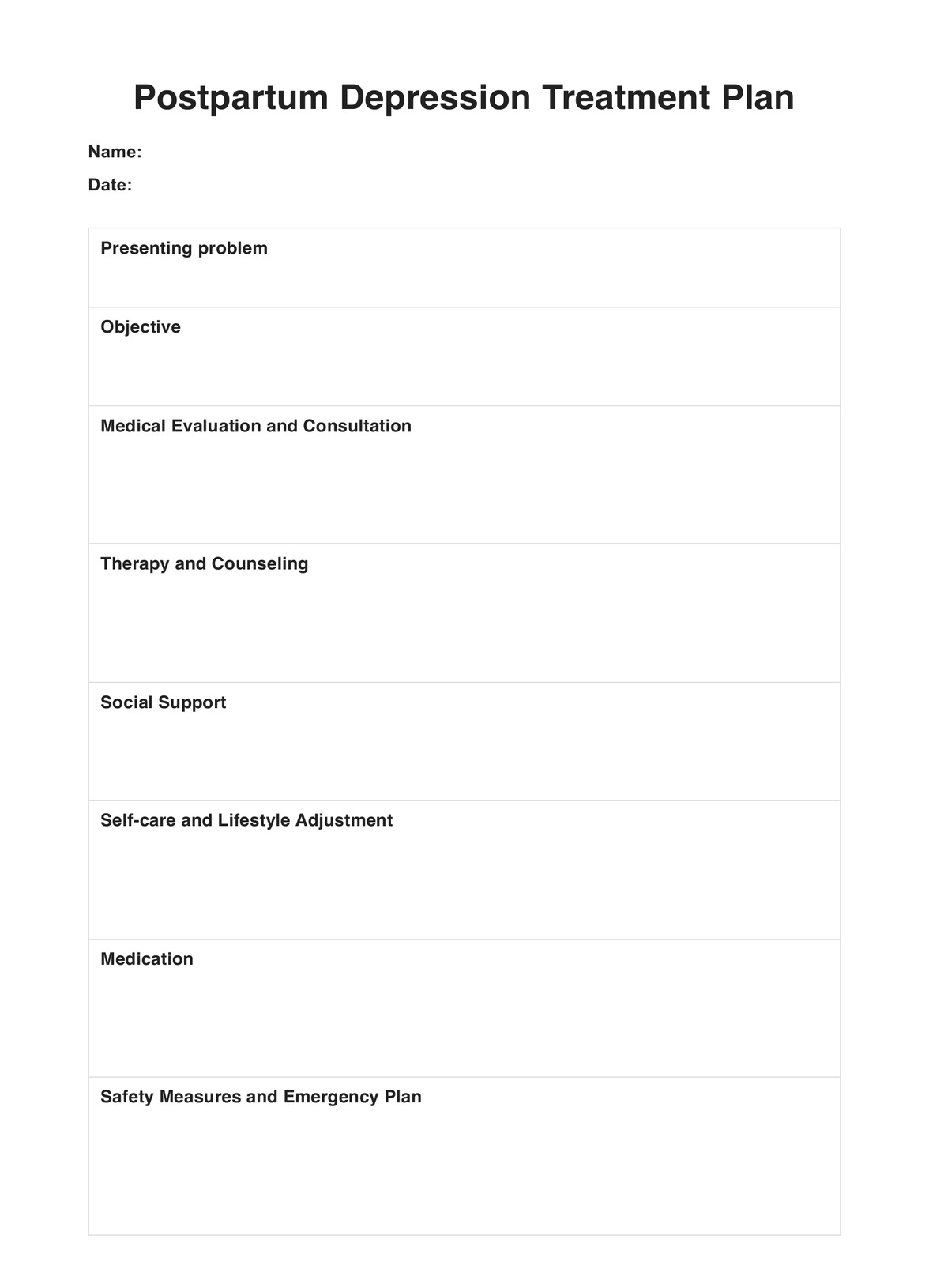
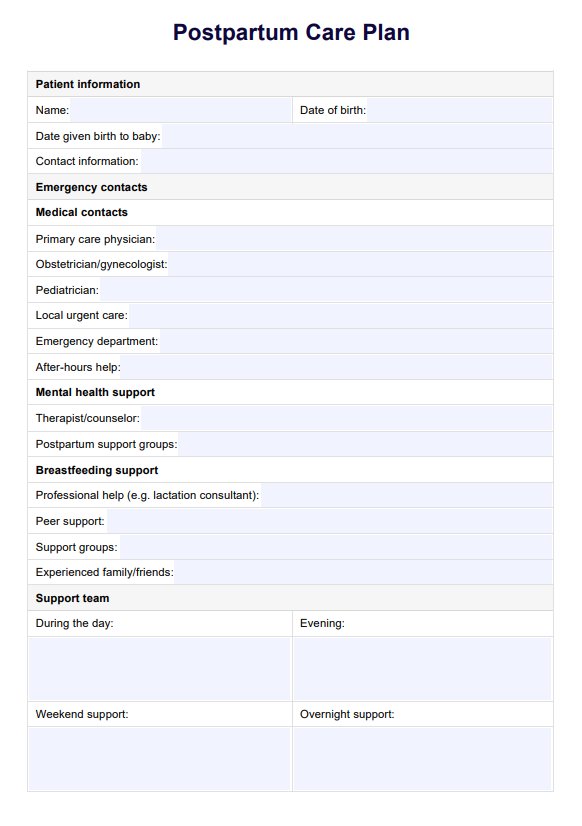













-template.jpg)






















































































